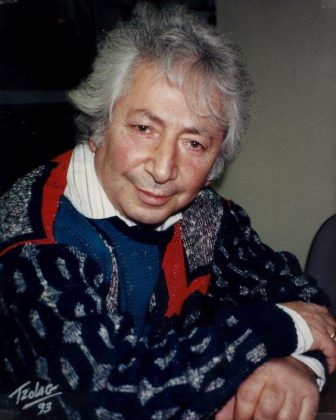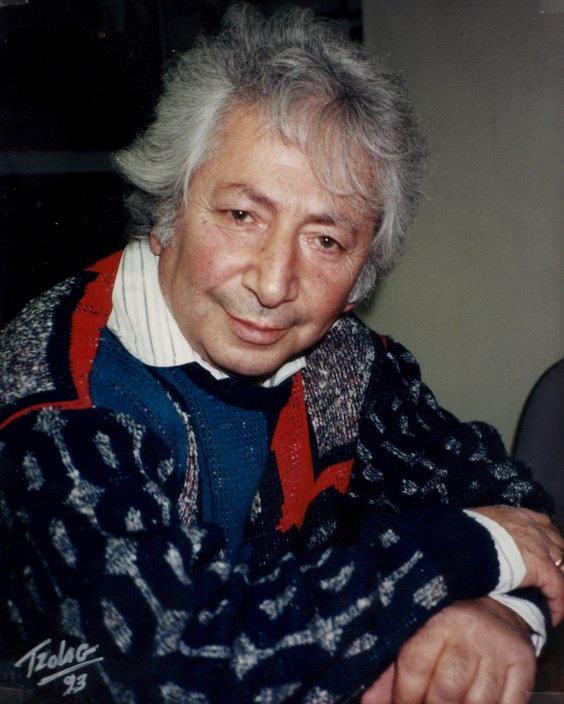
 By Margarita Hovhannisyan
By Margarita Hovhannisyan
Azad-Hye
The famous composer Sasun Paskevichyan has been a victim of Soviet morals. The musician, who had left for USA in 1980, returned to Armenia in 2004 to pick up where he had left off and initiated the creation of new cultural values.
“After returning to my homeland, I was once asked if nostalgia was what brought me back, and my answer was NO, because in these days, you could visit your homeland as much as you liked without going back there. What nostalgia could be in this case? Mine was a psychological return. My land was calling me. Remembering King Arshak's tale would suffice. There is an indescribable tie between a man and his ancestral soil.
When I was 11,000 kilometers away, it felt like there was no soil beneath my feet. It was then that I understood why his Holiness Catholicos Vazken I used to call those who left their countries “eradicated”. From the first day, I understood that being in a foreign country was the irony of fate. I attribute everything to God's will, as it is said in the Lord's Prayer: Thy will be done in earth as it is in Heaven. His divine intervention is in everything.”
Today, the word “song” is a concept with many meanings. They present “anything” to the audience under that name. What should a real song be like?
When we say “song”, first we understand that there should be lyrics and a melody. Although today the TV channels show us video clips instead. In any given song, the lyrics and the melody should be harmonious. Of course, this is if we are talking about a presentable song. We should not forget that we are talking about the culture, the spiritual nutrition, a component of which is the song. But nowadays, it has become like the sunflower seed. Imagine that you are invited to someone's birthday and they treat you sunflower seeds. Is it appropriate? It's the same when they perform low quality songs in concerts (dashi dushi). It's different when we're at a wedding reception, people would get drunk and they'd want to dance. Once during a wedding I paid attention to a song and it was the same sentence over and over again, 140 times. “Everyone has his own concerns, just like the willow and the poplar”.
Sasun classifies the singers in five categories. According to him, 60% merely sing. A section of the 40% perform and the rest interpret. 3 or 4 percent only feel the character and only 1 or 2 percent are the ones in whom the character gets, i.e. the song finds the singer. The song is also made up of five elements. The first one is the creator, the second is the singer, the third is the arranger, the fourth is the orchestra and the fifth is the recording. If any of these elements is flawed, the song will be negatively affected.
How should the Armenian song be nowadays and how is it in reality?
When William Saroyan was asked “who is Armenian?”, he answered: “Whoever considers himself Armenian”. A song is lingual mentality. The Armenian song is our ethnic psychology, our history with its past and present. But what is today's generation listening to? Bad music, because listening to the same thing over and over again makes you addicted. Today, the art of singing in Armenia is neglected for different reasons: There's a newly formed retail market, where the natty ones are able to sell their stuff, but the good song will never find its place there.
Those who are capable of creating songs rather can imitating others, are unfortunately ignored. The reason behind this situation is the ubiquitous indifference. Njteh used to say: “If you remove music and poetry from a nation, it would become a pigsty.” We have started to sing “other” songs and this is dangerous. We have started to notice cultural sects. We are repeating Wales' same story. In the 13th century, England wanted to conquer Wales, but wasn't able to do so for many years. Then the English king found the way. He started to introduce his culture to Wales, and the latter automatically joined England… No need for me to comment.
Creating a song is a complex but at the same time a wonderful process. How are the lyrics and the melody born inside you?
I attribute everything to God. My songs are born thanks to the spirit He has granted me. Although I'm a constructor by profession, I have been given the spirit of a song-writer. Sometimes I dream of songs while I'm asleep, so I immediately wake up in the middle of the night, sit at the piano and start to play and record it, lest I forget it. By the way, I don't have any musical education; I can't even read the notes. The spirit that I have inside me is what prompts me to compose a song.
Once I was driving my car when suddenly the melody of (kuzem himi pche zurnen) hit me. And I said, this is it. I went back home, I played it and thus the song was composed.
As Sayat Nova said: “My water is of different waters”. You can get the water, the H2O by different means, but my “water” springs from the depths of the Armenian land.
Sasun who humbly considers himself to be first an art lover, still has a lot to give. The new generation has also started to communicate with his songs, listening to and singing the melodies, some of which have been sung and celebrated by many renowned Armenian artists in the past.
“There's this saddening phenomenon among us. Many of our highly ranked gentlemen – whether they deserve the position they are given or not – have a bad habit. They always give away the titles honored and popular to this and that. The modesty of the great ones does not allow them to be noticed; instead, the foam surfaces the water, and is surprisingly appreciated. However, the genuine audience and time are the fair judges, who always have the last word.”
Translated by Nanor Mikayelian
YouTube selection:
1) Song: “You went away”, lyrics and music by Sasun Paskevichyan, performed by Bella Darbinyan:
https://www.youtube.com/watch?v=M5QrF6bmch8
2) Interview with Sasun Paskevichyan on Kentron TV:
http://www.youtube.com/watch?v=51pYis7GUOA
3) Interview with Sasun Paskevichyan on “Nights of Yerevan” program (from minute 13:01):
http://www.youtube.com/watch?v=BSgo5GmRi44
TEXT IN ARMENIAN
?Հայաստանում երգարվեստն այսօր անտերության է մատնված?. Սասուն Պասկեւիչյան
Մարգարիտա Հովհաննիսյան
Ազատ-Հայ
Սովետական բարքերի զոհ է եղել նաեւ հայտնի երգահան Սասուն Պասկեւիչյանը: 1980-ին Միացյալ նահանգներ տեղափոխված երաժիշտը հայրենիք է վերադառնում 2004-ին: Հանձն է առնում շարունակել անավարտ գործեր եւ ձեռնամուխ լինում մշակութային նորանոր արժեքների արարման:
– Հայրենիք վերադառնալուց հետո մի առիթով ինձ հարցրեցին` կարո՞տը Ձեզ բերեց. ասացի` ոչ, որովհետեւ մեր օրերում, առանց վերադառնալու, սրտիդ ուզածի չափ կարող ես այցելել քո երկիր. ինչ կարոտի մասին է խոսքը? Իմը հոգեբանական վերադարձ էր: Ինձ հողն էր կանչում: Բավ է հիշել Արշակ թագավորի պատմությունը: Աննկարագրելի հզոր կապ կա մարդու եւ հայրենի հողի միջեւ: Երբ 11 հազար կիլոմետր հեռավորությամբ էի, մի տեսակ հող չէի զգում ոտքերիս տակ: Հետո հասկացա, թե Վազգեն Ա. կաթողիկոսն ինչու էր հեռացածներին ?արմատախիլներ? անվանում: Գնացածս առաջին իսկ օրվանից հասկացա, որ օտար ափերում հայտնվելս ճակատագրի սարկազմն էր: Այնուամենայինվ, ամեն ինչ վերագրում եմ Աստծո կամքին, ինչպես Տերունական աղոթքի մեջ է ասվում` ?Քո կամքը թող լինի ինչպես երկնքում, այնպես էլ երկրի վրա?. ամեն ինչում Արարչի նախախնամությունն է?
– Երգ կոչվածն այսօր մի տեսակ բազմանշանակ հասկացություն է դարձել, եւ այդ անվան նորքո լսարանին հրամցնում են ?ամեն ինչ?: Ինչպիսի՞ ն պիտի լինի իսկակա'ն երգը:
– Երգ ասելով նախ հասկանում եմ խոսք եւ երաժշտություն, թեեւ այսօր հեռուստատեսությամբ երգի փոխարեն մեզ հրամցնում են ?վիդեոկլիպ?: Երգի մեջ բառերն ու մեղեդին պետք է համահունչ լինեն: Իհարկե, եթե խոսքը կարգի'ն երգի մասին է: Հարկ է չմոռանալ, որ մենք խոսում ենք մշակույթի` հոգեւոր սնունդի մասին, որի բաղկացուցիչն էլ երգն է: Մնչդեռ այն ներկայումս արեւածաղիկի սերմ է դարձել: Մի պահ պատկերացնենք, որ հրավիրում են, ասենք, ծննդյան տոնի եւ արեւածաղիկի սերմով են հյուրասիրում. արդյո՞ք տեղին է? Նույնն է, ինչ համերգի են հրավիրում եւ` ?ձեռքերդ վե՜ր, տաշի՜, տուշի՜?.?: Բոլորովին այլ է հարսանիքների պարագայում. մարդիկ գինովցած են լինում ու զուտ պարել են ուզում? Մի հարսանիքի ժամանակ հատուկ ուշադրություն դարձրեցի հնչող երգին` 140 անգամ նույն տողն էր կրկնվում. ?Ամեն մարդ իրա դարդին, ինչպես ուռին ու բարդին??
Սասուն Պասկեւիչյանը երգիչներին 5 կարգի է դասում: Ըստ նրա`100-ից 60-ը երգող են: 40-ից մի մասը կատարում է, մյուս մասը` մեկնաբանում: 100 -ից 3- 4-ն են, որ մտնում են կերպարի մեջ, եւ 1 կամ 2-ն են, որոնց մեջ տեղավորվում է կերպարը,- այսինքն` երգը գտնում է երգչին,-ասում է նա` հավելելով, որ երգն էլ իր հերթին 5 անկյուններում է երգ դառնում. առաջինը` ստեղծագործողն է, երրորդը` երգիչը, երրորդը` գործիքավորողը, չորրորդը` նվագախումբը, հնգերորդը` ձայանագրությունը: Եթե այս 5-ից որեւէ մեկը թերանում է, երգը տուժում է:
– Ինչպիսի՞ ն պետք է լինի հայկական երգը եւ ինչպիս՞ին է այսօր:
– Վիլյամ Սարոյանին հարցնում են` ո՞վ է հայը, ասում է` ով իրեն հայ է համարում: Երգը լեզվամտածողություն է: Հայ երգը մեր էթնիկ հոգեբանությունն է, պատմությունը` անցյալն ու ներկան: Սական ի՞ նչ են այսօր ունկնդրում? Լսում են վա'տ երաժշտություն, որովհետեւ անընդհատ նույնը ստանալով հայտնվել են կախվածության մեջ? Հայաստանում երգարվեստն այսօր անտերության է մատնված`տարբեր պատճառներով: Ձեւավորվել է մի իսկական ?մանրածախ շուկա?, որտեղ ճարպիկները ?հրամցնում? են իրենց ապրանքը, իսկ լավ երգն այստեղ տեղ գտնել չի կարող: Այն մարդկ, ովքեր կարողանում են ոչ թե ?թխել? (արտագրել), այլ երգեր ստեղծել, ցավոք, անտեսված են: Իսկ այս բարձիթողի իրավիճակի պատճառը համատարած ու քար անտարբերությունն է: Նժդեհն ասում էր` ?Հանիր ազգից երաժշտությունն ու պոեզիան եւ այն գդառնա խոզանոց?: Մենք սկսել ենք ?ուրիշ? երգեր երգել, իսկ դա արդեն վտանգավոր է. մեզանում մշակութային աղանդներ են ձեւավորվել: Մենք Ուելսի նույն պատմությունն ենք կրկնում. 13-րդ դարում Անգլիան ուզում է նվաճել Ուելսը, սակայն երկար տարիներ չի հաջողվում: Հետո Անգլիայի թագավորը ձեւը գտնում է` իր մշակույթը ներմուծում է Ուելս, եւ վերջինս ինքնաբերաբար միանում է Անգլիային: Մեկնաբանությունների կարիք չկա?
– Երգ ստեղծելը բարդ ու միեւնույն ժամանակ հրաշալի գործընթաց է: Ինչպե՞ ս կնկարագրեիք` Ձեր մեջ ինչպես է ծնունդ առնում բառ ու մեղոդին:
– Ամեն ինչ Աստծուն եմ վերագրում, իմ երգերը Նրա տված ոգու շնորհիվ են ծնվում: Թեեւ մասնագիտությամբ շինարար եմ, բայց երգաստեղծի ոգի է ինձ շնորհված: Պատահում է, որ քնած ժամանակ երազիս մեջ երգեր եմ լսում, հենց գիշերն էլ նստում եմ դաշնամուրի մոտ եւ անմիջապես նվագում ու ձայնագրում, որ հետո չմոռանամ: Ի դեպ, ես երաժշտական կրթություն չունեմ` անգամ նոտաները չգիտեմ: Այն ոգին, որ մարդու մեջ է, այդ ինքն է մղում երգ ստեղծելու: Մի անգամ մեքենայով ինչ-որ տեղ էի գնում ու հանկարծ, հենց ղեկին ?կուզեմ հիմի փչե զուռնեն? տողի երաժշտությունն ?եկավ?. ասեցի ` սա է, որ կա ու մեքենան ետ` դեպի տուն ուղղեցի: Ճանապարհին երաժշտությունն անընդհատ կրկնում էր, որ չմոռանայի: Եկա տուն, նվագեցի ու այդպիսով երգը շարունակվեց:
Ինչպես Սայաթ-Նովան է ասել, ?Իմ ջուրն ուրիշ ջրերեն է?: Ջուրը ՝ H2O-ն , տարբեր միջոցներով կարելի է ստանալ, իսկ իմ ?ջուրը? հայրենի հողի խորքորից է գալիս?
Համեստաբար իրեն նախեւառաջ արվեստասեր համարող երգահանը դեռ շատ ասելիք ունի: Նրա ստեղծագործությանը հաղորդակից լինել սկսել է նաեւ նոր սերունդը` ունկնդրելով ու երգելով այն մեղեդիները, որոնց մի մասը ժամանակին փայլեցրել են հայ մեծանուն շատ երգիչներ:
ՀԵՏԳՐՈՒԹՅՈՒՆ: Այդուհանդերձ տրտմեցնող երեւույթ կա մեզանում: Զանազան պաշտոնների տեղի-անատեղի բազմած մեր այրերը մի վատ սովորություն ունեն. նրանք միշտ ?վաստակավորի?, ?ժողովրդականի? տիտղոսներն ?աջ ու ձախ? են շաղ տալիս? Մեծերի համեստությունը թույլ չի տալիս որ իրենց նկատեն, փոխարենը փրփուրն է ջրի երես ելնում` նկատելի դառնում ու զարմանալիորեն գնահատվում: Բայց եւ այնպես, ճշմարիտ ունկնդիրն ու ժամանակն արդար դատավորներ են եւ վերջին խոսք միշտ իրենցն է:
